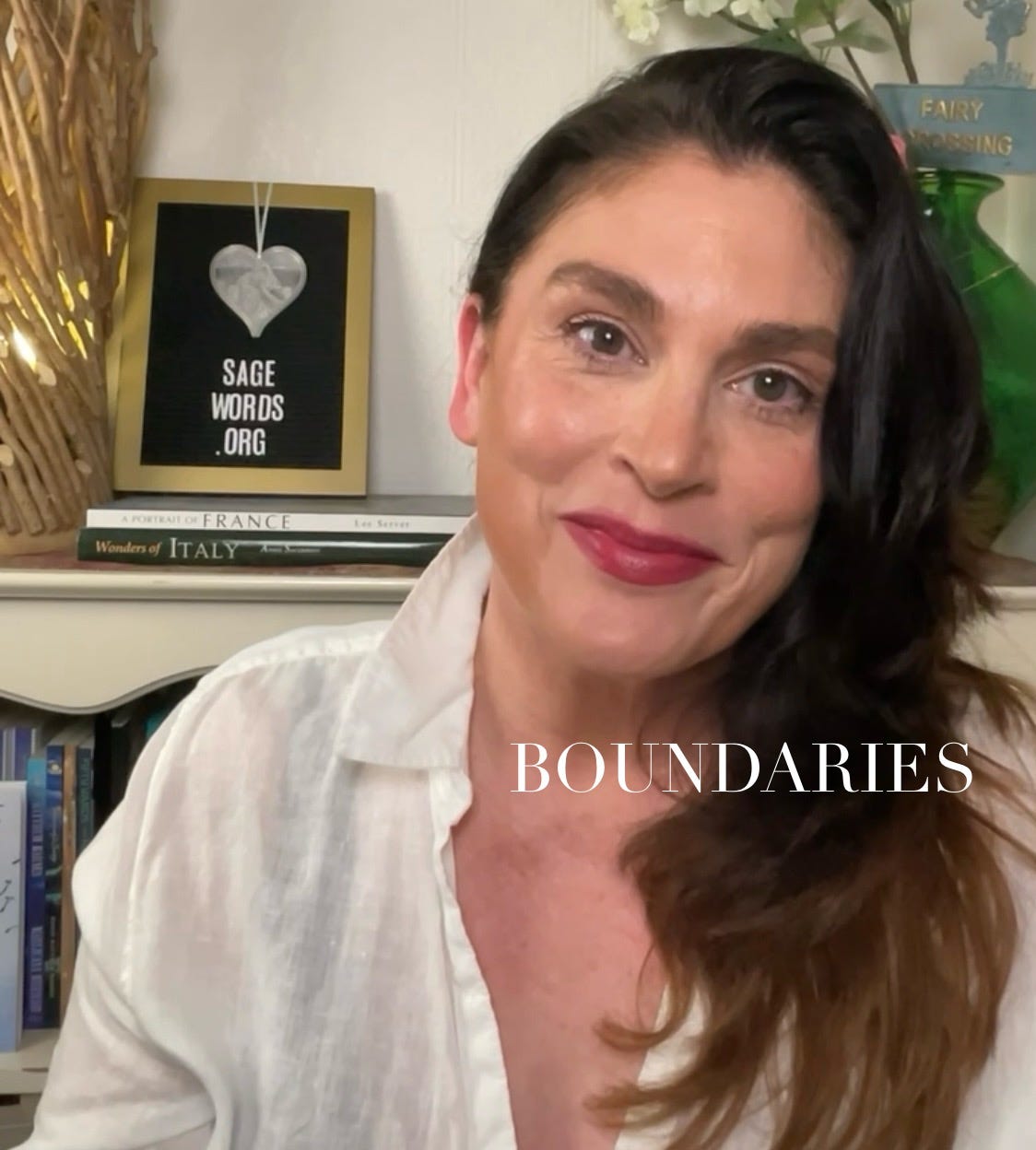The expression, “Pearls before swine” comes from the Bible. Jesus stated, "Do not…cast your pearls before the swine, lest they trample them under their feet, and turn around and tear you in pieces" (Matthew 7:6). I interpret this as, “Don’t offer pearls of wisdom and careful explanations to people who are only looking to twist your words and use them against you.” I am not religious. I was, however, raised on proverbs that have fine-tuned the needle of my moral compass and “pearls before swine” has been a cautionary tale mantra for most of my life.
Girls and women are taught to over-explain, because they are often expected to convince people of facts instead of just presenting them—thereby perpetually spilling their pearls before swine. As a writer, it’s part of my job to explain things. This bled into my personal life. As a habit, I’d spent too much of my life explaining myself. A few years ago, I began the journey of mindfully clutching my pearls, so to speak. It’s a boundary, and it has saved me from countless dramas. However, when I’m fatigued, I still fall into old habits that don’t serve me. Maybe you can relate? Someone does something to bait us into battle, while we’re tired or distracted by work or parental duties; and before we know it, we’re tripping on our own pearls (another reason daily meditation is so important to our mental, emotional, and physical health. It helps to keep us present enough to know when we’re being triggered and offers us a practice to not react).
At some point in time, each and every one of us, including the most even-keeled among us, will still find ourselves feeling the need to explain ourselves, our beliefs, or even to defend ourselves against false accusations or contemptuous judgments. The bolder or less conforming we are in life, the more of both pearls and judgement we are likely receive. I encourage all to explain, when to do so brings them joy; but we must know our audience. It’s better to clutch our pearls ironically than throw them before swine intentionally; we don’t have to explain ourselves to anyone.
When people place judgment before understanding, it’s often because they are projecting their own issues on to us because they are triggered by our presence or comparing the limitations of their personal experience to the perceived varied vastness of our own (perceived being the operative word), which may be a world beyond comprehension until they’ve had more exposure. For example, imagine someone born and raised in the Amish community who suddenly finds themselves on the set of RuPaul’s Drag Race (or vice versa): how does one interpret what they see and hear if the only lexicon of reference is an exclusionary or elite dictionary? Some of us live simple lives designed by other people’s simple rules, and some of us live complex lives designed by our own complex rules. It’s hard for anyone to understand something they haven’t experienced firsthand.
If we spend our precious resources trying to pull others from their tribalistic mentality, from the extremes to find the middle, to educate them on the nuances in life and convince them of our truth, we can exhaust ourselves into oblivion. This can also set a precedent that we will endlessly make time to defend ourselves against their missteps, confusions, and false accusations. No one has time for that, not even spiritual teachers. In those situations, historical sages have offered patience and acceptance. Here are four things we can do instead of throwing pearls before swine:
1. Allow others to be wrong about us. It will all come out in the wash, and the truth will eventually be known. We cannot convince people of a truth they are not yet ready to hear or able to accept. They will either come around on their own, realize they were wrong about us, and apologize if their pride will allow; or they will move on and out of our lives. There is nothing we can do to change the mind of someone who is dead set against us (often times to benefit their own self-preservation).
2. We can learn the art of acknowledging while saying nothing. On social media, it looks like the thumbs up emoji—a check mark of respectful acknowledgement we can give another without having to add a comment and engage any further. In person, it’s active listening/mirroring, which is repeating back to someone a summary of what they have just shared with us in a way that illustrates we heard and understand them, which is not to say we agreed, or have a desire to change their opinions, or discuss it further. We are allowed to respectfully disagree with the people we like and love.
3. Agree with them. Nothing takes the steam out of an argument like agreement. If someone says to us, “Are you so preoccupied with maintaining your own peace that you refuse to engage in the drama I’m manufacturing?” We can say, “Why, yes. Yes I am.” Then, stop speaking. Let silence do the work for us. If we are accused of something legitimate for which we are guilty, we can admit to it, offer an apology and to repair the situation. This is so much easier than denying and defending against an honest accusation. We can simply say, “Thank you for bringing that to my attention. My apologies. Here’s the corrective action I intend to take to prevent repeating my mistake. If I fail, I hope you will offer me grace with the understanding that we are all flawed and that I’m doing my best.”
4. Let people have the last word; sometimes it’s all they have. Imagine being in their shoes, walking around guarded, angry, accusatory, and cynical about most everything in life; or being so insecure that they have to manipulate, instigate drama, and antagonize others to get attention; or needing to use status to feel superior or to make others feel less than (“some people are so poor, all they have is money”); or choosing to think the worst of others, assuming everything people do is somehow about them. How miserable, alone, small, and distraught they must feel inside. The least we can do is allow them the honor of having the last word and feeling heard.
We Are All Pearls and Swine
In the name of oneness, it’s valuable to note that at some point we each take turns being the pearl and the swine. When I embrace humility and recall times when my own hubris prevented me from accepting pearls of wisdom, it helps me have compassion for all those who have been unintentionally hurtful, including myself.
The people who judge us harshly often do so because they judge themselves harshly too, or they had a parent or social pressures who held them up to standards they conformed to and therefore they expect others to conform to as well. People can only know us as deeply as they have come to know themselves; and, in a culture, distracted by checking off boxes that equal success by societies standards, few people have the time or inclination to come to know themselves deeply, as that knowing may reveal that they have betrayed themselves in order to be culturally accepted by others.
When To Walk Away
The minute we are no longer being heard is the minute we should stop speaking. When the discussion becomes circular with rationalization, deflection, defensiveness, or gaslighting, it’s time to stop. When we come to that moment in a conversation that devolves into a confrontation, or name calling, or we recognize someone is projecting their issues on to us, that’s the time to press the pause button and interrupt the pattern. Effective communication is no longer taking place. It’s best to change the subject or excuse ourselves (to the bathroom or wherever) to give ourselves some physical space and a break to just breathe. This doesn’t mean we give up on a person or a cause, it means we give it a rest and come back at another time or in another way. However sometimes, when a person’s identity is too fragile to even allow themselves to consider a different way of thinking (back to our Amish vs drag queen lifestyle), it may mean having to let it go versus let it be.
When to Share Our Pearls?
Cast the pearl to the person who is more curious than judgmental, who is receptive to contemplating an opinion contrary to their own, who is willing to look in the mirror and take accountability to pull the metaphorical spinach from their teeth. Cast the pearl to those brave enough to embrace change. Cast when we feel we must, but choose to have no attachment to how our pearls are received. Pearls are created by the grit of parasites. Many pearls lay untouched, unseen; still, they are glorious like the diamond that’s formed by pressure. Those of us who have been exposed to grit or crushed by unbearable weight know how to sparkle and shine, whether seen or unseen.
There’s a Chinese proverb that says, “The one who blames others has a long way to go on their journey. The one who blames themselves is halfway there. The one who blames no one has arrived.” Blame no one. We can choose to take radical responsibility for our life. It helps to understand that facts are meaningless, when being played out in a society in which people are behaving as characters in the play, The Crucible. We must stay true to who we are anyway. There will be times in life that we are called to explain ourselves and times when the best course of action is to remain quietly patient and speak only with a few words or none at all. Life has a way of correcting itself without our interference, without the need to throw pearls before swine.
Sage Justice is achingly sincere. Balancing wisdom and humor she most often writes deeply personal solution based pieces about the enduring virtues that connect us all: love and healing. She is an award-winning playwright and critically acclaimed performing artist who has appeared on stages from Madison Square Garden in New York City, to The Comedy Store in Hollywood, California. Ms. Justice is the author of Sage Words FREEDOM Book One, an activist, a member of the Screen Actors Guild and an alumna Artist-In-Residence of Chateau Orquevaux, France. She is a co-founder of The Unity Project which fuses activism with art, to educate and inspire, with a special emphasis on community engagement to end homelessness. She has a series of short reels about living with the rare genetic disorder, Vascular Ehlers-Danlos Syndrome that you can find in a highlight reel on her Instagram page @SageWords2027.





